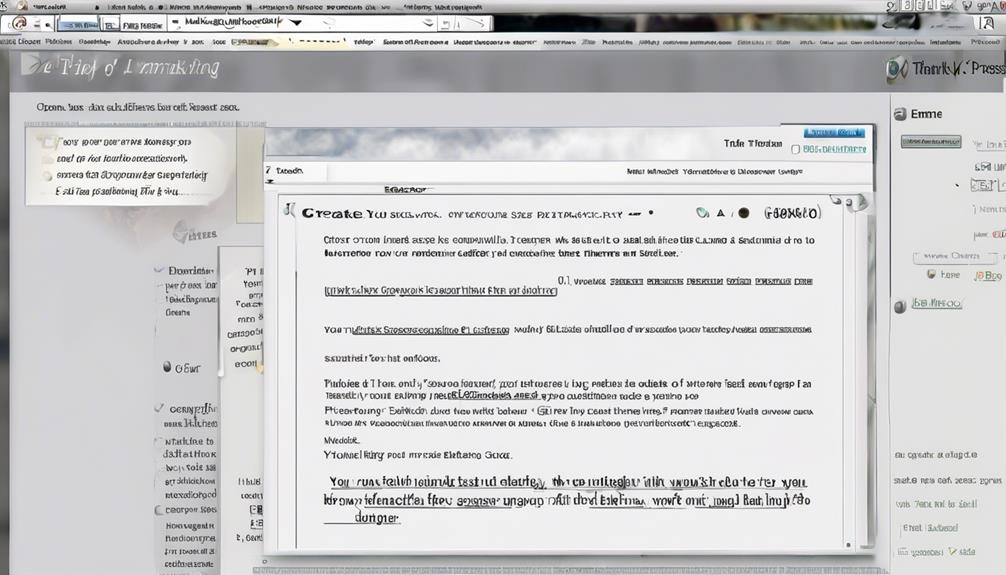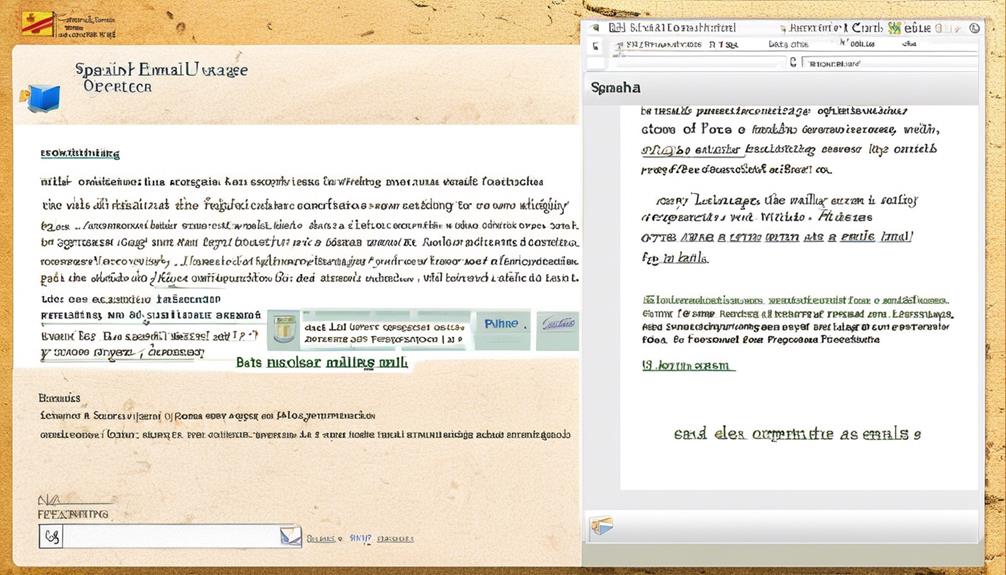In the digital era, writing a thank you email to a professor is similar to offering a virtual handshake to show appreciation. However, the challenge lies in finding the perfect equilibrium between being formal and conveying warmth in our expressions of thanks.
It's a question that often lingers as we navigate the etiquette of reaching out to our mentors. Let's explore the nuances of crafting a thank you email that resonates with sincerity and respect, without feeling overly formal or casual.
Key Takeaways
- Thank you emails are important for recognizing the impact of professors on academic and personal growth.
- Proper email format and personalized greetings are essential for conveying respect and admiration.
- The teaching style and personalized guidance of a professor greatly impact the learning experience.
- It is important to maintain a professional tone, use clear subject lines, and convey gratitude effectively in thank you emails to professors.
Importance of Thank You Emails
Acknowledging the importance of thank you emails is essential in recognizing the significant impact a professor has on a student's academic and personal growth.
When we take the time to send a thank you email to our professors, we not only show gratitude for their dedication but also strengthen the bond between student and educator.
It's crucial to express appreciation for the knowledge and wisdom imparted during classes, as well as for the guidance provided outside the classroom. Thank you notes aren't just a formality but a genuine way to convey our respect and admiration for the professor's teaching style and effective learning methods.
By doing so, we create a positive learning environment and foster a relationship built on mutual respect. Moreover, it communicates our recognition of the professor's role in our academic success and future aspirations.
Therefore, taking a moment to send a well-crafted thank you email is a simple yet powerful way to demonstrate how much we learn from and appreciate our professors.
Etiquette for Emailing Professors

When emailing professors, it's crucial to maintain a respectful and formal tone throughout the communication.
We should also pay attention to the proper format of the email, including a clear subject line and a well-structured message.
These etiquette guidelines help ensure that our emails are professional and convey our gratitude effectively.
Emailing Professor Respectfully
To ensure effective communication with professors, it's important to maintain a respectful and professional tone when composing emails. When emailing professors, it's crucial to remember that they're busy individuals, so being respectful of their time and effort is essential.
Here are a few key points to consider:
- Use Proper Salutations: Address the professor with the appropriate title, such as 'Dr.' or 'Professor,' followed by their last name.
- Be Clear and Concise: Clearly state the purpose of your email in the subject line and keep the message brief and to the point.
- Express Gratitude: Always thank the professor for taking the time to read your email or for their hard work, patience, and dedication to creating an engaging teaching style.
Proper Email Format
Emailing professors requires adhering to proper email etiquette to ensure effective communication and convey respect for their time and expertise.
When writing thank you emails to professors, it's crucial to use a proper email format. Start with a clear and professional subject line that reflects the purpose of your email. Address the professor with the appropriate title and their last name, unless they've specified otherwise.
Begin your email with a polite greeting, such as 'Dear Professor [Last Name],' and clearly state the reason for your email in a concise and respectful manner.
Always conclude the email with a polite closing, such as 'Thank you, [Your Name].'
Personalized Greetings
When emailing our professors, it's important to start with a customized opening that acknowledges our relationship and expresses gratitude.
Tailoring our salutation to reflect the professor's title and last name adds a respectful touch to our email.
The body of the message should be personalized to show genuine appreciation and mention specific reasons for gratitude.
Customized Email Opening
Addressing the professor with their preferred title and last name, such as 'Dr. Smith' or 'Professor Johnson,' sets a respectful tone for the email. When crafting a customized email opening, it's essential to personalize the greeting to convey gratitude and respect. Here's how to do it effectively:
- Use the professor's preferred title and last name to address them respectfully.
- Begin the email with a personalized greeting, such as 'Dear Dr. [Professor's Last Name],' to establish a courteous tone.
- Take into account any specific preferences the professor has for how they like to be addressed and customize the greeting accordingly.
Tailored Salutation
In composing a personalized email to express gratitude to a professor, it's crucial to employ a tailored salutation that reflects respect and acknowledges the professor's expertise and mentorship.
When addressing the professor, use their formal title and last name, such as 'Dear Professor Smith,' to show professionalism. If your relationship allows for it, consider using a more personalized salutation, like 'Dear Dr. Smith,' to recognize their expertise and mentorship. It's important to consider the professor's preferred title and any cultural or regional differences when addressing them. If unsure, seek direct guidance or consult other students or faculty members.
A respectful and personalized salutation sets the tone for the gratitude expressed in the email and reflects your appreciation for the professor's support and guidance.
Personalized Message Body
Expressing heartfelt gratitude towards a professor for their guidance and support is essential in crafting a personalized email. When composing the body of the message, it's crucial to ensure that the content is tailored to reflect genuine appreciation and acknowledgment of the impact the professor has had on your academic journey.
To achieve this, consider the following:
- Specific Thank You: Express gratitude for the professor's specific teaching methods or mentorship that have helped you learn and grow.
- Personal Anecdote: Share a personal anecdote or example of how their guidance or support influenced your academic or personal growth, demonstrating the impact of their teaching.
- Warm Closing: Conclude with a warm closing that reiterates your gratefulness and appreciation for their dedicated teaching and support.
Crafting a personalized message body that incorporates these elements will effectively convey your appreciation and gratitude.
Expressing Gratitude

We are deeply grateful for the invaluable guidance and support provided by our professor. Expressing gratitude in a thank you email is essential to show appreciation for the teacher of the year. Our learning experience has been enriched by the professor's dedication and passion for teaching. Their encouragement and commitment to helping students succeed have truly made a difference in our academic and personal development.
| Reason for Gratitude | Impact on Us | Appreciation |
|---|---|---|
| Personalized guidance and support | Enhanced our understanding of the subject matter | Thank you for your unwavering support |
| Positive influence on academic and personal development | Encouraged us to strive for excellence | We are grateful for your positive influence |
| Dedication and passion for teaching | Inspired us to love learning | Thank you for being an exceptional teacher |
| Commitment to helping students succeed | Provided valuable mentorship | We appreciate your dedication to our success |
| Overall contribution to our learning experience | Created a positive and supportive learning environment | Thank you for making our learning experience memorable |
We express our deepest gratitude for the profound impact you have had on our academic journey. Best wishes for your future endeavors.
Sharing Specific Examples

Throughout our time in Professor Smith's class, their dedication and expertise made a significant impact on our understanding of the subject matter. We're excited to share specific examples of how their teaching and mentorship have contributed to our learning experience:
- Encouraging and Engaging Teaching Style: Professor Smith's interactive teaching style created an environment where we felt comfortable asking questions and participating in discussions. Their ability to break down complex concepts into digestible parts significantly enhanced our comprehension.
- Personalized Guidance and Support: Professor Smith's willingness to provide additional resources and individualized feedback outside of class time was invaluable. Their commitment to our academic growth went beyond the standard expectations of a professor, and we appreciate the mentorship provided.
- Innovative Learning Opportunities: From organizing guest lectures to incorporating real-world examples into the curriculum, Professor Smith continuously inspired us to apply theoretical knowledge to practical situations. This approach not only deepened our understanding but also fostered an enduring enthusiasm for the subject matter.
We have learned a great deal from Professor Smith's exemplary teaching and guidance and want to express our heartfelt gratitude for their impactful contributions to our academic journey.
Maintaining Professional Tone

In crafting a thank-you email to a professor, it's essential to maintain a professional tone throughout the message. When writing a thank you email to a professor, it's important to convey gratitude in a manner that reflects a respectful and appreciative tone.
Expressing thanks for the professor's guidance, encouragement, and patience throughout the academic year is crucial. We want to ensure that our email is formal and respectful, avoiding overly casual language or slang. It's important to use formal language and salutations to maintain a professional tone and to conclude the email with a formal closing, such as 'Sincerely' or 'Best regards'.
We should keep the email concise, focusing on expressing our thanks sincerely and respectfully without going into unnecessary detail. It's important to acknowledge the professor's impact and convey gratitude for their support and guidance. We should express how grateful and appreciative we're for the professor's efforts in making the academic year a rewarding and enriching experience.
Conciseness in Emails

When writing emails to professors, it's important to keep our message clear and concise. We want to express our gratitude without overwhelming them with unnecessary details.
Email Length
Craft your thank you email to your professor with brevity and clarity, ensuring that unnecessary details are excluded and your gratitude is expressed succinctly.
When considering email length, it's crucial to keep the content concise and to the point. Here's how to achieve conciseness in your thank you email:
- Keep it brief: Avoid including unnecessary details or information that may dilute the core message.
- Use bullet points: Highlight key points using bullet points to make the email easy to read and comprehend.
- Respect the recipient's time: Be mindful of your professor's time and get straight to the point when expressing your gratitude.
Crafting a well-written thank you email with appropriate length and clarity is essential in demonstrating professionalism and respect for your professor's time.
Clear Subject Line
To ensure effective communication, we employ a clear and concise subject line to convey the purpose of our email. When writing a thank you email to a professor, it's essential to use a clear subject line that reflects the content and purpose of the email. Below is a table to illustrate the importance of a clear subject line in a thank you email to a professor:
| Clear Subject Line | Importance |
|---|---|
| Reflects purpose of email | Helps professor understand the context |
| Concise and to the point | Makes it easy for the professor to identify |
| Avoids vagueness | Ensures the email is not overlooked |
| Indicates gratitude | Sets the tone for a formal and grateful note |
In a formal setting, such as when thanking a teacher, a clear subject line is crucial for effective communication and conveying gratitude.
Polite Language
We express our gratitude using polite language and concise expressions in our emails to professors, ensuring a respectful and clear communication. When writing a thank you email to a professor, it's crucial to maintain a balance between formality and warmth.
Here are key points to consider:
- Use formal salutations and maintain professionalism in your email to convey respect for your professor's position and expertise.
- Be specific about what you're thankful for to express your gratitude clearly and concisely, showing that you value the professor's time and effort.
- Highlight what you learned from your professor to demonstrate the impact of their teaching on your academic growth, reinforcing the value of their guidance.
Additional Tips for Thank You Emails

When expressing gratitude to your professor via email, it's essential to personalize the message by highlighting specific ways their teaching has positively influenced your learning experience and growth.
In addition to this, there are several additional tips for crafting a meaningful thank you email.
Firstly, express gratitude for the professor's enthusiasm, dedication, and availability for questions and guidance. This demonstrates awareness and appreciation for their efforts.
Secondly, highlight any specific skills or knowledge you gained under their mentorship, showcasing the impact of their teaching on your academic and personal development.
Moreover, it's important to conclude the email with well wishes for the professor's future and a respectful closing, showing that you value the ongoing relationship.
Lastly, double-check the email for any grammatical or spelling errors before sending to ensure professionalism.
Incorporating these additional tips will further personalize and enhance the sincerity of your thank you email to your professor.
Sample Email Template

Crafting a sincere thank you email to your professor is an important gesture that demonstrates appreciation for their dedication and guidance throughout your academic journey. When writing a thank you email to your professor, it's crucial to maintain professionalism by using formal salutations.
Be specific about what you're thankful for, such as the knowledge and skills you've gained under their guidance. Highlight the valuable lessons and insights you've learned from your professor, expressing gratitude for their enthusiasm and dedication to education.
Here's a sample email template to help you get started:
Subject: Gratitude for Your Support
Dear Professor [Last Name],
I hope this email finds you well. I wanted to take a moment to express my sincere gratitude for teaching me this semester. Your dedication to your students and your unwavering support have truly motivated and supported me throughout the course.
I appreciated the way you [specific example of their teaching style or a particular lesson]. Your guidance has been invaluable, and I'm grateful for the skills and knowledge I've gained under your mentorship.
Thank you once again for your support and for being an inspiring mentor.
Sincerely,
[Your Name]
Thanking for Mentorship

Expressing gratitude for the invaluable mentorship provided by a professor is essential to acknowledging their guidance and support throughout our academic journey. Thanking for mentorship is not only a courtesy but also a genuine appreciation for the wisdom and encouragement we have received. Our professor has been a great mentor, and we have learned a lot from their expertise. The class meetings were always eye-opening, and their ability to make things very simple has left a lasting impact on us. Here's a table to summarize the key reasons we are grateful for our professor's mentorship:
| Reasons for Gratitude |
|---|
| 1. Learned a lot |
| 2. Class meetings were always eye-opening |
| 3. Great professor |
| 4. Excited to learn |
| 5. Much for keeping things simple |
When crafting a thank you email to our professor, it's important to express our gratitude for their mentorship explicitly. Acknowledging their role in our academic and personal growth will not only make them feel appreciated but also strengthen our professional relationship.
Thanking for Support

We greatly appreciate the support and mentorship provided by our professor throughout our academic journey.
1) The professor's unwavering support has been instrumental in our academic growth, and we're truly grateful for the time and effort invested in our learning.
2) Their guidance hasn't only motivated us to strive for excellence but has also fostered an environment where we've felt valued and appreciated.
3) We've learned invaluable lessons from the professor's expertise, and their dedication to our success has been a source of inspiration.
The support extended by our professor has been pivotal in shaping our academic experience, and we're deeply thankful for the encouragement and assistance provided.
We've truly appreciated the professor's commitment to creating a positive learning environment, and it has made a significant impact on our educational journey.
Thank you, Professor, for your unwavering support, which has played a pivotal role in our growth and development as students.
Following Up After Email

As a courteous practice, it's advisable to send a polite and concise follow-up email if a response hasn't been received within a reasonable timeframe. This not only demonstrates our appreciation for the professor's time and consideration but also ensures that we stay engaged in the learning environment.
In the follow-up email, we can express our thankfulness for the professor's patience and encouragement, which greatly contributes to a positive and conducive learning atmosphere. It's important to maintain a friendly and respectful tone while inquiring about the status of our previous email. We can also offer to provide any additional information if needed, showing our willingness to assist in any way possible.
However, it's crucial to be mindful of the professor's schedule and not inundate them with multiple follow-up emails within a short period.
In closing the follow-up email, we can once again express our gratitude, thank the professor for their great job in creating an engaging learning environment, and provide our contact information for any further communication.
Impact of Thank You Emails

After following up with a polite and concise email, it's essential to understand the impact of expressing gratitude through thank you emails to professors.
Here are three key impacts of sending thank you emails to professors:
- Fostering a Positive Learning Environment: Thank you emails can create a supportive atmosphere by acknowledging the professor's dedication to teaching and mentorship, thereby enhancing the overall learning experience for both the student and the professor.
- Strengthening Student-Professor Relationships: Expressing gratitude through a thank you email can make the professor feel valued and appreciated, ultimately strengthening the bond between the student and the professor. This can lead to enhanced communication and collaboration during class meetings and beyond.
- Motivating and Inspiring Educators: Thank you emails can serve as a source of motivation for professors, reinforcing the significance of their role in students' lives. It highlights how their teaching and guidance have been instrumental in the students' learning and personal growth, fostering a sense of accomplishment and fulfillment.
Is the Format for Thank You Email to a Professor Different from Email to a Teacher?
Yes, the format for a thank you email to a professor is slightly different from an email to a teacher. When writing email to teacher tips, it’s crucial to be formal, respectful, and to use proper salutations and titles for professors. It’s also important to express gratitude and be concise in your communication.
Frequently Asked Questions
How Do You Say Thank You to Your Professor in Email?
We say thank you to our professor in an email by expressing our gratitude for their guidance and support.
It's important to be sincere and specific about how their assistance has been beneficial. We can also mention any specific advice or feedback that had a positive impact on us.
It's crucial to maintain a respectful and professional tone throughout the email.
How Do You Write a Thank You Email to a Professor Reddit?
We craft thank-you emails to professors with sincere appreciation, weaving gratitude and respect into each word. Our messages reflect genuine admiration for their guidance, expertise, and unwavering support.
We infuse our emails with warmth and humility, acknowledging the profound impact they've had on our academic journey. These expressions of gratitude resonate deeply, forging connections that transcend the digital realm and resonate in the hearts of our esteemed professors.
How Do You Write a Thank You Email?
We write a thank-you email by expressing genuine appreciation, being specific about what we're thankful for, and maintaining a professional yet friendly tone.
We ensure to use formal salutations and double-check for any errors.
It's important to highlight what we've learned from the individual we're thanking. This helps to create a meaningful and impactful message.
How Do You Express Gratitude to a Teacher?
We express gratitude to a teacher by showing genuine appreciation for their dedication, guidance, and support.
It's essential to acknowledge their impact on our learning journey and the positive influence they've had on our academic and personal growth.
Recognizing their efforts through heartfelt words, a thoughtful note, or a small token of appreciation can go a long way in expressing our gratitude for their invaluable contribution to our education.
Conclusion
In conclusion, sending a heartfelt thank you email to a professor can have a significant impact on building strong relationships and showing appreciation for their guidance.
By sharing specific examples of how their teaching has impacted us, we can deepen the connection and express our gratitude in a meaningful way.
It's important to follow up after the email and continue to stay in touch, as this can lead to further mentorship and support from the professor.









